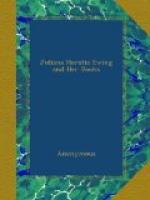“It is,” said Dennis.
“Play it a bit quicker, man, and I’ll try ‘Scots, wha hae.’”
Dennis quickened at once, and Alister stood forward. He neither fidgeted nor complained of feeling shy, but, as my eyes (I was squatted cross-legged on the deck) were at the level of his knees, I could see them shaking, and pitied him none the less that I was doubtful as to what might not be before me. Dennis had to make two or three false starts before poor Alister could get a note out of his throat, but when he had fairly broken the ice with the word “Scots!” he faltered no more. The boatswain was cheated a second time of his malice. Alister could not sing in the least like Dennis, but he had a strong manly voice, and it had a ring that stirred one’s blood, as he clenched his hands and rolled his R’s to the rugged appeal—
Scots, wha hae wi’ Wallace bled,
Scots, wham Bruce has aften led;
Welcome to your gory bed,
Or to victory!
Applause didn’t seem to
steady his legs in the least, and he never
moved his eyes from the sea, and his face only
grew whiter by the
time he drove all the blood to my heart with—
Wha will be a traitor knave?
Wha can fill a coward’s grave?
Wha sae base as be a slave?
Let him turn and flee!
“GOD forbid!” cried Dennis impetuously. “Sing that verse again, my boy, and give us a chance to sing with ye!” which we did accordingly; but, as Alister and Dennis were rolling R’s like the rattle of musketry on the word turn, Alister did turn, and stopped suddenly short. The Captain had come up unobserved.
“Go on!” said he, waving us back to our places.
By this time the solo had become a chorus. Beautifully unconscious, for the most part, that the song was by way of stirring Scot against Saxon, its deeper patriotism had seized upon us all. Englishmen, Scotchmen, and sons of Erin, we all shouted at the top of our voices, Sambo’s fiddle not being silent. And I maintain that we all felt the sentiment with our whole hearts, though I doubt if any but Alister and the Captain knew and sang the precise words—
Wha for Scotland’s King
and law
Freedom’s sword will
strongly draw,
Freeman stand, or freeman
fa’?
Let
him on wi’ me!
The description of Alister’s song, as well as that of Dennis, was to some extent drawn from life, Julie having been accustomed to hear “Scots, wha hae” rendered by a Scot with more soul than voice, who always “moved the hearts of the people as one man” by his patriotic fire.
My sister was greatly aided by two friends in her descriptions of the scenery in “We,” such as the vivid account of Bermuda and the waterspout in Chapter XI., and that of the fire at Demerara in Chapter XII., and she owed to the same kind helpers also the accuracy of her nautical phrases and her Irish dialect. Certainly this second part of the tale is full of interest, but I cannot help wishing that the materials had been made into two books instead of one. There are more than enough characters and incidents to have developed into a couple of tales.




